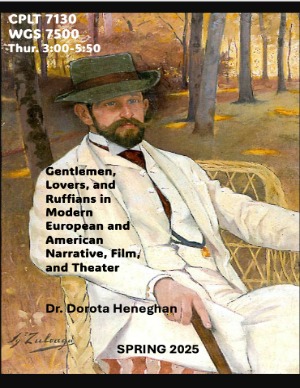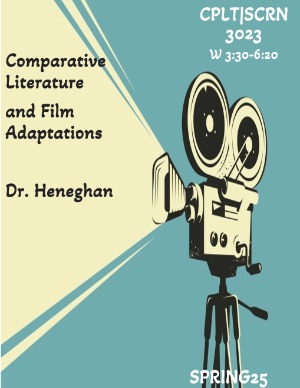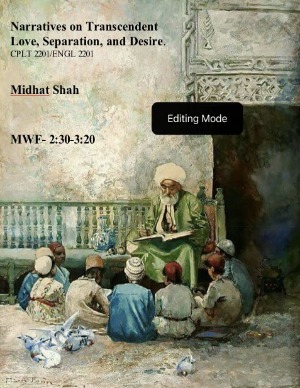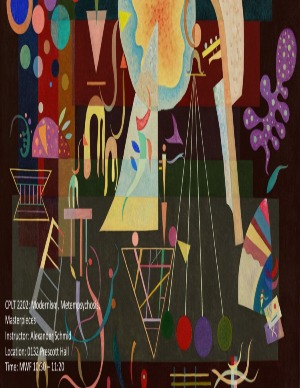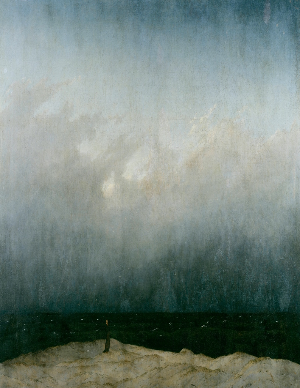2024-2025 Courses
Spring 2025
Graduate Courses
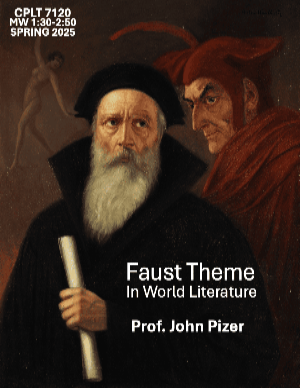
CPLT 7120: Faust Theme in World Literature
Instructor: Dr. John Pizer
Time: MW 1:30-3:00 p.m.
Faust is one of the great figures of world literature. He is the quintessential individual dissatisfied with mortal, earthly limitations who is willing to sell his soul to the devil (Mephisto) for absolute power and absolute knowledge. The three main works we will cover are Chistopher Marlowe’s Dr. Faustus, Johann Wolfgang von Goethe’s Faust (Parts I and II) and Thomas Mann’s Dr. Faustus, but we will read and discuss several other variations on the Faust myth as well. Grading is based on an oral report and a term paper developed from the oral report.
CPLT 7130 /WGS 7500: Gentlemen, Lovers, and Ruffians in Modern European and American Narrative, Film, and Theater
Instructor: Dr. Dorota Heneghan
Time: TH 3:00-5:50 p.m.
This course examines the interdisciplinary ways in which writers, playwrights, and film directors explored the impact of modernization on the constructions of masculinity in nineteenth- and twentieth-century Europe and the United States. We will look how the literary and visual representations of specific ideals of gender enabled European and American artists to support as well as to warn against challenges of modernization. Authors include: Benito Pérez Galdós, Leopoldo Clarín, Emilia Pardo Bazán, Arthur Conan Doyle, and Anton Chekhov and ZofiaNalkowska. We will accompany our readings with theoretical texts on gender, film, and theater (Connell, Mosse, Felski, Stam, Gallagher). All reading and visual materials are in English or have English subtitles. Class discussions are in English.
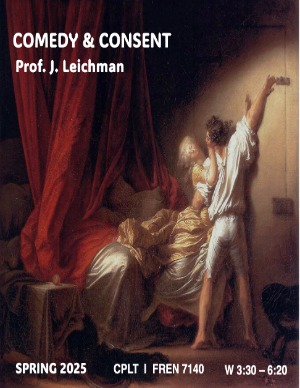 CPLT 7140/FREN 7140: Comedy and Consent
CPLT 7140/FREN 7140: Comedy and Consent
Instructor: Prof. Jeffrey Leichman
Time: W 3:30-6:20 p.m.
Consent is the bedrock of modern subjectivity, the faculty that underwrites an individual’s determination of who may or may not enter into relationships with them. The modern discourse of consent originates in the Enlightenment, long considered the dawn of Western modernity, a period during which many emerging ideas around secularization and individual autonomy that continue to determine modern understandings of self and society were transmitted in simplified versions through widely accessible performances of theatrical comedies. This course seeks to bring together two disparate theoretical concerns to reevaluate the unexamined relationship between consent and comedy, understood both in its narrow generic meaning as the theatrical form devoted to representation of everyday life and the more general sense of humorous works and performances.
Consent, whose “moral magic” (Hurd) transforms violations into invited forms of interaction, exists in tension with the coercive nature of laughter-producing affect (as well as with the unknowability of inner intention that characterizes modern acting), which elicits an involuntary and perhaps unwanted reaction to its manipulation of rhetorical and social codes. This conflict takes on even greater resonance in the context of the Enlightenment-era comedy, which thematized consent in plots built around non-noble, everyday characters. The behavioral, psychological and social patterns observable in these widely influential performance-based works in turn shed light on the problems around consent that have emerged as significant areas of debate in moral philosophy and law in the twenty-first century, highlighting scenarios in which consent is invited, faked, extorted, or unwittingly granted in service of comic plots whose conclusions invariably reinscribe existing power relations. We’ll look at these paradigmatic (and problematic) ethical templates for the navigation of consent in everyday life alongside theoretical texts on the function and significance of comedy, with a special focus on how European stages frame questions of consent with respect to the early modern colonial world. Plays to include works by Farquhar, Goldsmith, Molière, Marivaux, Beaumarchais, de Gouges, Kötzebue, Goldoni and others; theoretical works (on consent and comedy) by Alexander, Bergson, Dougherty, Hurd, McAlpin, Morreal, Vigarello, Wertheimer and others. Course conducted in English; reading primary texts in the original encouraged.
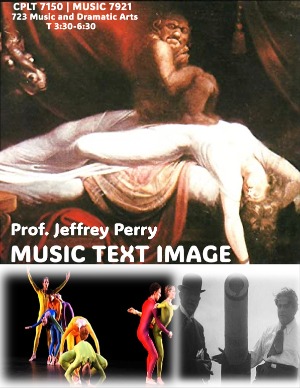
CPLT 7150/MUS 7921: Music, Text, Image
Instructor: Prof. Jeffrey Perry
Time: T 3:30-6:30 p.m.
An interdisciplinary exploration of music, music drama, poetry, literature, and the visual and kinetic arts in the 19th, 20th, and 21st centuries. Although the course will focus on Western art, popular, and folk musics as a connective element, students will be encouraged to seek out connections between repertoires and modalities that resonate with their own backgrounds and interests. Although this seminar will focus on music, students taking it under the CPLT course number will not be expected to be able to read music.
Undergraduate Courses
CPLT 3023/SCRN 3023 Comparative Literature and Film Adaptations
Instructor: Dr. Dorota Heneghan
Time: W 3:30-6:20 p.m.
This course examines the complex cultural work of adapting literature to film. Through critical analysis of narrative fiction from around the globe—short stories, novels, plays—and the films they inspire, students will investigate the history, narrative, conventions, iconic elements, and cultural significance of literary adaptations to film. As we read and watch, we will consider the following questions: What are the relations between comparative literature and cinema? How do cinematic elements (lighting, costuming, acting, etc.) contribute to or confound your understanding of the literary texts? How literary works complicate the cinematic experience? How do literary texts and their respective cinematic adaptations reflect the societies and conditions that produce them? Literary texts and films will include works by Spanish, German, British, American, Russian and Polish artists. All visual and literary materials are in English.
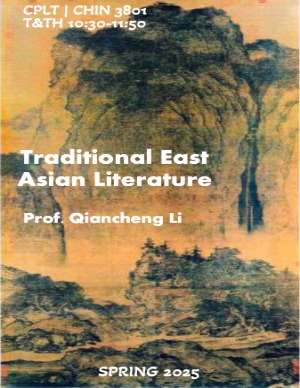
CPLT 3801/CHIN 3801:Traditional East Asian Literature
Instructor: Prof. Qiancheng Li
Time: T, TH 10:30-11:50 a.m.
Introduction to the genres, themes, and representative works of traditional Chinese and Japanese literature; emphasis on critical reading. Comparative possibilities between Chinese and Japanese literature and between Eastern and Western literature encouraged and rigorously pursued.
Texts include: Classic of Poetry (Shi jing); Songs of the South (Chu ci); Yuefu selections; Tao Yuanming; Six Dynasties; Tang poetry; Wang Wei; Li Bo; Du Fu; Bo Juyi; Li Shangyin; Lushi (regulated verse); Ci (Song-lyrics); Su Shi; Collection of Ten Thousand Leaves (Man'yoshu); Collection of Ancient and Modern Poems (Kokinshu); Shinkokinshu; Saigyo; Basho; Chinese theater; Peony Pavilion; Japanese No (Noh) Drama; Tale of Genji; Story of the Stone (aka Dream of the Red Chamber). All texts in English translation.
Taught in English; knowledge of East Asian languages not required.
No books to be purchased. All reading materials on Moodle.
CPLT 2201/ENGL 2201: Introduction to World Literary Traditions: Narratives on Transcendent Love,
Separation, and Desire.
Instructor: Midhat Shah
Time: MWF 2:30-3:20 p.m.
The theme of divine love or "عشق" has been a source of inspiration for writers from all cultures and traditions, since ancient times. This motif encompasses themes such as passion, devotion, displacement, separation, self-discovery, spiritual quests, and immortality. These themes have been explored in texts of immense depth and complexity, ranging from epic poems to didactic literature. Throughout history, these works have provided entertainment, solace, and inspiration to audiences around the world.
This module aims to provide students with insight into the interpretation and motifs of divine love, loss, and longing by examining a specific selection of texts in English translation (poetry and prose) by authors from different regions such as Africa, the Middle East, South and Southeast Asia, and Europe, from Antiquity to Renaissance. The course will delve into the works of a diverse range of writers, including Meister Eckhart, Maulana Rumi, Hadewijch, Mira Bhai, and Lalla Dyad. The students will critically analyze and interpret a wide range of texts, engaging with a variety of critical approaches while exploring these works in their cultural, intercultural, and historical contexts.
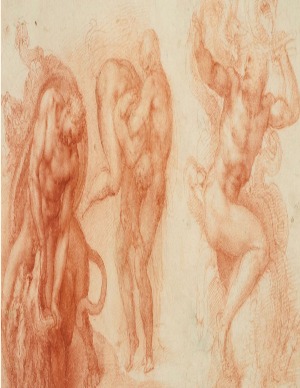 CPLT 2201/ENGL2201: Introduction to World Literature: The Hero in Ancient and Early
Modern
CPLT 2201/ENGL2201: Introduction to World Literature: The Hero in Ancient and Early
Modern
Instructor: Marie-Gabrielle Delahoussaye
Time: T, Th 12:00-1:20 p.m.
The aim of this course will be to introduce students to literature as a dialogical experience, one which illuminates universal themes through the very things that make each culture and each man unique. Special attention will be paid to the concept of “The Hero” as it appears across a variety of literary traditions and genres, from Ancient to Early Modern Times. Students will be asked to reflect on what it means to live a good or exemplary life within various cultural, historical, and ethical frameworks. Together we will delve into the works of such giants as Homer, Plato, Dante, and Shakespeare. Emphasis throughout will be upon developing the ability to think independently, cogently, and decisively about fundamental issues that arise from reflection on the nature of human existence.
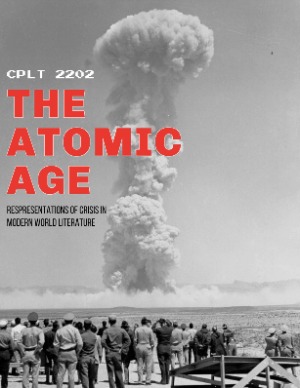 CPLT 2202/ENGL 2202: Introduction to Modern World Literature: The Atomic Age
CPLT 2202/ENGL 2202: Introduction to Modern World Literature: The Atomic Age
Instructor: Gabrielle Bologna
Time: MWF 11:30-12:20 a.m.
Welcome to World Literature II, where we will immerse ourselves in twentieth-century literature that bridges the gap between the dystopian and the real, as visions of our developing world are no longer rooted in futuristic, cautionary tales, but in the lived experiences of newer forms of state control and modern warfare. The literature of the Modern era is historically characterized by a collective sense of post-war disillusionment— in this course, we are tasked with identifying the ways in which the notions of advancement and destruction are prophesied by early twentieth-century writers, propelled by rapid scientific and industrial change, and how later wartime generations build upon and disrupt reigning literary traditions. As we weave through fiction, reality, and hyperreality in the context of international conflict, our focus will turn toward a broader discourse surrounding sociopolitical and ethical issues in the proliferation of the warfare machine, and how these stories of crisis, evolution and revolution influence how we understand the past and imagine the future.
Required texts:
Yevgeny Zamyatin, We (1924)
Osamu Dazai, The Setting Sun (1947)
Graham Greene, The Quiet American (1955)
Philip K. Dick, Do Androids Dream of Electric Sheep? (1968)
CPLT 2202/ENGL 2202: Modernism, Metempsychosis, Masterpieces
Instructor: Alexander Schmid
Time: MWF 10:30-11:20 a.m.
Modernism is sometimes described as an art movement which eschews classical forms and techniques. But what does it mean for a text to be modern? Need it have been recently written, focus on certain themes, or be expressed in a certain genre? A masterpiece is defined by Harvard professor David Damrosch as a work of near classical value which is itself a literary analogy of a liberal democracy, but what does it really mean for a text to be a masterpiece? Does this term suggest a rank beyond the normal measure? Does it suggest a workmanship not witnessed in the average piece of art? Can a masterpiece also be a classic and piece of world literature? Or does it suggest something as banal as mere popularity? Join me on an adventure from the 17th century through the 20th century to inquire into these questions.
Required Texts:
- Cervantes, Miguel de. Don Quixote. Trans. Edith Grossman, Ecco; Reprint edition, 2005. ISBN: 978-0060934347.
- Goethe, Wolfgang von. Faust: A Tragedy. Trans. Walter W. Arndt., Ed. Cyrus Hamlin, W. W. Norton & Company; 2nd Ed. 1998. ISBN: 978-0393972825.
- Dostoevsky, Fyodor. Notes from the Underground. Ed. Michael R. Katz, W. W. Norton & Company; 2nd ed., 2000. ISBN: 978-0415045407.
- Joyce, James. Ulysses. Vintage, first ed., 1986. ISBN: 978-0394743127.
- Mann, Thomas. The Magic Mountain. Trans. John E. Woods, Vintage, 1996. ISBN: 978-0679772873.
- Woolf, Virginia. Mrs. Dalloway. Vintage, 1st Edition, 2016. ISBN: 978-1784870867.
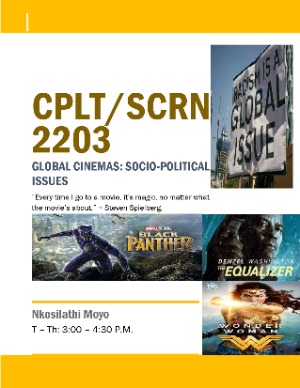
CPLT 2203/SCRN 2203: Global Cinemas: Socio-Political Issues
Instructor: Nkosilathi Moyo
Time: T, Th 3:00-4:30 p.m.
This course takes a thematic approach in the study of representations of socio-political issues in popular cultural forms including films, short stories, newspaper articles, and short essays. The course will present three main regional foci: North America, Africa, and Europe. The issues or thematic areas that we will explore include, but are not limited to, race, colonialism, immigration, poverty, war, terrorism, and climate change. Our study of each thematic area will always entail a class screening of films from all three continental regions of our focus. Film screenings will constitute an entire class period and film discussions will occur in the subsequent class meeting. All reading materials for this course will be provided on Moodle. We will study works of such writers as James Baldwin, Frederick Douglas, Charlie Chaplin, Mbongeni Ngema, Ousmane Sembene, and more.
Fall 2024
Graduate Courses
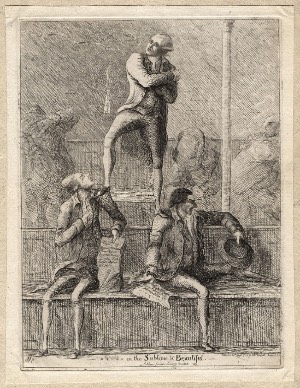
CPLT 7010: Research Methods and Bibliography: Introduction to Literary Theory
from Antiquity to Romanticism
Instructor: Dr. Gundela Hachman
Time: M 3:30-6:30 p.m.
In this course, we explore foundational works in literary theory from the Classical through the Romantic period. This course enables students to learn about and engage in long-standing debates about the purposes and values of literature as well as of its perceived dangers and limitations.
In this course, students practice the art of standing on the shoulders of giants, i.e. they explore the many ways in which we can engage and interact with foundational texts that have decisively shaped our discipline and the critical methodologies we practice. In assignments, students learn to give scholarly presentations, respond with critical reviews to contemporary scholarship, and compose essays in literary theory. The Norton Anthology of Theory and Criticism will serve as primary course material, and we will supplement as needed for additional details or contexts.
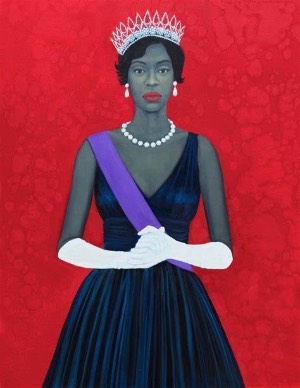
CPLT 7120 / ENGL 7221: Recent Black Culture Theory
Instructor: Dr. Casey Patterson
Time: W 3:30-6:30 p.m.
This course will read a selection of 21st century Black cultural theorists (such as Saidiya Hartman, C. Riley Snorton, Darby English, and David Scott) alongside relevant cultural objects. Special emphasis will be placed on the works of Christina Sharpe and Dionne Brand, in preparation for their short residency with the new HSS Humanities Center at LSU. During this residency, Sharpe and Brand will join one of our seminars.
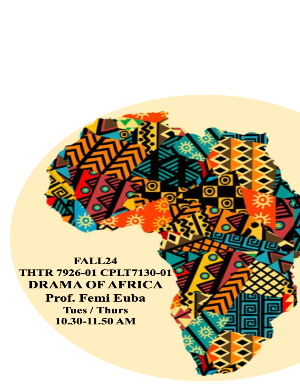 CPLT 7130 / THTR 7926: Drama of Africa
CPLT 7130 / THTR 7926: Drama of Africa
Instructor: Dr. Femi Euba
Time: T, Th 10:30-11:50 a.m.
A comparative study of the dramatic and theatrical expressions of the black cultures in Africa, identifying, where possible, not only African influences on some of the dramatic works in the diaspora, but also the Western classical influences on African plays. Works include those by Wole Soyinka, Ngugi Wa Thiong’o, Efua Sutherland, Ama Ata Aidoo, Athol Fugard et al, Tewfik Al-Hakim, etc.
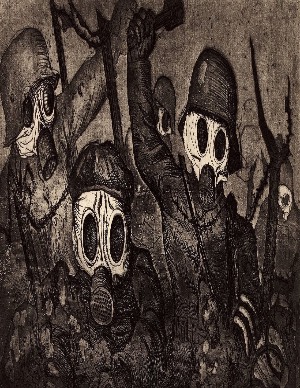 CPLT 7130: Literature of the Great War
CPLT 7130: Literature of the Great War
Instructor: Dr. Asher Gelzer-Govatos
Time: T, TH 1:30- 2:50 p.m.
A transnational approach to the literature of World War I, considering both the more famous poetry and the novels. Put in broad historical context, starting with literature written just before the war, then encompassing works written during the war itself (including trench poetry), then finally works that looked back on the war in the shadow of the looming second world war. Poets would include: Wilfred Owen, Isaac Rosenberg, Georg Trakl, Guillaume Apollinaire, Ezra Pound, and David Jones. Novelists/short story writers would include: Franz Kafka, Henri Barbusse, Ernst Junger, Rebecca West, Mulk Raj Anand, and Joseph Roth.
CPLT 7140: Verbal Visual Theory and Analysis
Instructor: Dr. Adelaide Russo
Time: T 3:00-5:50 p.m.
The course will be dealing with texts from the French, English, and Spanish 19th to the 21st century writers and artists and address interdisciplinary approaches to major artistic movements – realism, impressionism, surrealism, conceptual art, abstract art, and hyperrealism.
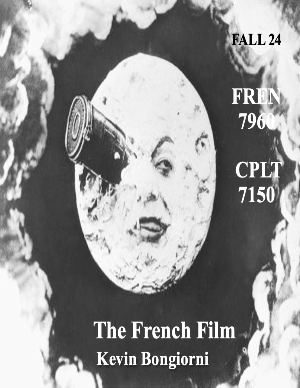
CPLT 7150 / FREN 7960: The French Film
Instructor: Dr. Kevin Bongiorni
Time: T 6:00-9:00 p.m.
This course will examine French film from its inception with the Lumière brothers and Georges Méliès to Amour and Agnès Varda’s Visages Villages. It will approach films from a variety of critical and theoretical perspectives and contexts including semiotics, Existentialism, film theory and criticism, the French New Wave, Cahiers du Cinémacritics, Sergei Eisenstein’s theory of Montage, literary and film techniques and more. The is designed as a seminar. Students will be actively involved in each class meeting and will be responsible for weekly readings and viewings, presentations, and leading class discussions. Additional assignments may include frame, shot and sequence analyses, and a final conference length paper that will be presented at the time of the final exam in a mini conference format.
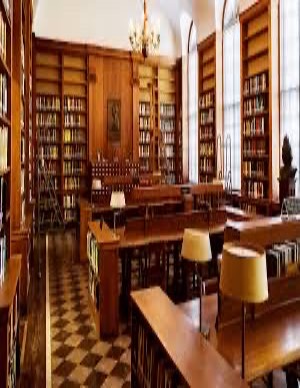
CPLT 7170: Methodology for Teaching World Literature
Instructor: Dr. Dorota Heneghan
Time: TH 3:00-6:00 p.m.
The goal of this course is twofold: 1) introduce students to current and past debates about questions of method, purpose, and challenges to teach world literature 2) explore a set of pedagogical techniques to create syllabi related to the selected theme in a variety of texts and films spanning the chronological periods to which the current undergraduate courses: CPLT 2201/ ENGL 2201, CPLT 2202 / ENGL 2202 and CPLT 2203 / SCRN 2203 correspond. In addition to surveying comparative literature’s history and approaches to teaching world literature and global cinema, students will examine methods for using secondary sources for original interpretation and presentation of selected texts and films, selection and development of teaching materials, observations of classes and reflective self-assessment.
Undergraduate Courses
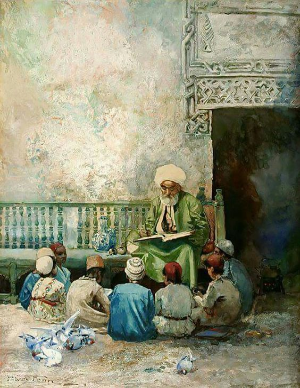
CPLT 2201 / ENGL 2201: Narratives on Transcendent Love, Separation, and Desire
Instructor: Midhat Shah
Time: MWF 2:30-3:20 p.m.
The theme of divine love or "عشق" has been a source of inspiration for writers from all cultures and traditions, since ancient times. This motif encompasses themes such as passion, devotion, displacement, separation, self-discovery, spiritual quests, and immortality. These themes have been explored in texts of immense depth and complexity, ranging from epicpoems to didactic literature. Throughout history, these works have provided entertainment, solace, and inspiration to audiences around the world.
This module aims to provide students with insight into the interpretation and motifs of divine love, loss, and longing by examining a specific selection of texts in English translation (poetry and prose) by authors from different regions such as Africa, the Middle East, South and Southeast Asia, and Europe, from Antiquity to Renaissance. The course will delve into the works of a diverse range of writers, including Meister Eckhart, Maulana Rumi, Hadewijch, Mira Bhai, and Lalla Dyad. The students will critically analyze and interpret a wide range of texts, engaging with a variety of critical approaches while exploring these works in their cultural, intercultural, and historical contexts.
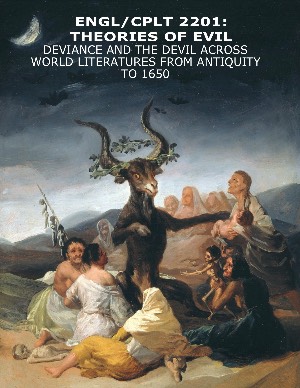 CPLT 2201/ ENGL 2201: Deviance and the Devil Across World Literatures from Antiquity
to 1650
CPLT 2201/ ENGL 2201: Deviance and the Devil Across World Literatures from Antiquity
to 1650
Instructor: Gabrielle Bologna Mesen
Time: MWF 11:30-12:20 p.m.
Across time and artistic media, portrayals of hell and the antichrist have long been associated with the political sector. These infernal images transform texts into cultural, historical artifacts: they are windows into episodes of crisis, mouthpieces for political ideologies rooted in a rejection of tyrannical, unrestrained authority. From the fallen angel of traditional Christianity to the demonic child-turned-ambassador of The Omen, the devil is consistently illustrated as rising from the ‘eternal sea’ of politics; these depictions often work to communicate the characteristics of a flawed nation and the necessary balance between church and state powers.
In this course, we will encounter the earliest personifications of evil and deviance in Western literature, and, consequently, the evolution of moral and ethical norms that accompanies them. With special attention to Western Europe and the spread of Christianity, we will read and discuss works from Greek antiquity to the Renaissance. As we question how portrayals of evil shape and challenge our views of both world literature and history itself, our goal is to shift toward a broader discourse surrounding lore, sociopolitics, and ethics in our rapidly changing world.
Required texts:
Inferno (Hollander) (2012)
Doctor Faustus (Signet) (2005)
Paradise Lost (Norton Critical) (2004)
Recommended texts:
The Hermeneutics of Hell (Palgrave Macmillan) (2017)
Nicomachean Ethics
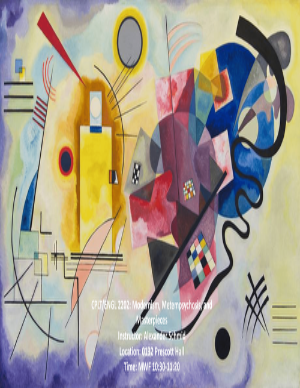
CPLT 2202 / ENGL 2202: Modernism,
Metempsychosis, and Masterpieces
Instructor: Alexander Schmid
Time: MWF 10:30-11:20 a.m.
Modernism is sometimes described as an art movement which eschews classical forms and techniques. But what does it mean for a text to be modern? Need it have been recently written, focus on certain themes, or be expressed in a certain genre? A masterpiece is defined by Harvard professor David Damrosch as a work of near classical value which is itself a literary analogy of a liberal democracy, but what does it really mean for a text to be a masterpiece? Does this term suggest a rank beyond the normal measure? Does it suggest a workmanship not witnessed in the average piece of art? Can a masterpiece also be a classic and piece of world literature? Or does it suggest something as banal as mere popularity? Join me on an adventure from the 17th century through the 20th century to inquire into these questions.
Required Texts:
1. Cervantes, Miguel de. Don Quixote. Trans. Edith Grossman, Ecco; Reprint edition, 2005. ISBN: 978-0060934347.
2. Goethe, Wolfgang von. Faust: A Tragedy. Trans. Walter W. Arndt., Ed. Cyrus Hamlin, W. W. Norton & Company; 2nd Ed. 1998. ISBN: 978-0393972825.
3. Dostoevsky, Fyodor. Notes from the Underground. Ed. Michael R. Katz, W. W. Norton & Company; 2nd ed., 2000. ISBN: 978-0415045407.
4. Joyce, James. Ulysses. Vintage, first ed., 1986. ISBN: 978-0394743127.
5. Mann, Thomas. The Magic Mountain. Trans. John E. Woods, Vintage, 1996. ISBN: 978-0679772873.
6. Woolf, Virginia. Mrs. Dalloway. Vintage, 1st Edition, 2016. ISBN: 978-1784870867.
CPLT 2202 / ENGL 2202: Introduction to World
Literature: Modernity and the Search for
Meaning
Instructor: Gabrielle Delahoussaye
Time:TTH 12:00-1:20 p.m.
The aim of this course will be to introduce students to literature as a dialogical experience, one which illuminates universal themes through the particularity of culture, personhood, and literary style. Our focus will be on the modern era, the period spanning from the late 1750s to the late 20th century. We will seek to immerse ourselves in this time of rapid change and profound upheaval, during which men found themselves unmoored from tradition and faced with ever more bewildering questions about human existence. We will explore the ways in which art came to possess an almost messianic purpose. That is, we will encounter authors who saw themselves, or were seen by others, as tasked with finding a way to navigate the paradigm emerging into being. In the works of figures such as Henry James, Gustave Flaubert, and Fyodor Dostoevsky, one discovers strikingly original visions of what it means to be human during troubled times. Students will be asked to reflect on the complexities of love, reason, and meaning which animate the stories chosen for our course. Emphasis throughout is upon developing the ability to think independently, cogently, and decisively about the fundamental issues of modern life.
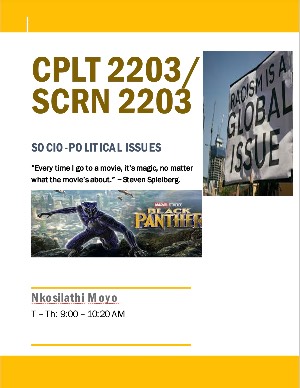 CPLT 2203 / SCRN 2203: Social-Political Issues
CPLT 2203 / SCRN 2203: Social-Political Issues
Instructor: Nkosilathi Moyo
Time: TTh 9:00-10:20 a.m.
In this course, we will explore a wide range of historical and contemporary socio-political issues that have beleaguered humanity globally. The issues that will be explored include racial inequality, gender inequality, human rights, war, terrorism, immigration, global warming, poverty, etc. The course will investigate how these are depicted in diverse popular literary forms, including, but certainly not limited to, film, hip-hop music, poetry, short stories, and newspaper articles. Essentially, we will take a thematic approach to the course, and each theme will constitute a module. The course material will cover three regions of the world: North America, Africa, and Europe. Authors and filmmakers to be discussed include Beyonce, Kendrick Lamar, Zuluboy, Richard Wright, Alice Walker, Mbongeni Ngema, Ryan Coogler, Tyler Perry, Jonathan Olshefski, and others. All required course materials will be made available through Moodle
